In 2021, I read 29 good books. I don’t think I have enjoyed reading as much as I have these past few years. My reading is layered. Some books I read hard copies of, others through Kindle, and others I listen to on Audible. Some of the books I read through all three mediums so I can enjoy the stories more, dig in and retain the messages, points, principles, and journal what I am learning/receiving.
I don’t have the Bible on my list because the Bible is not a book I merely read. It is more like food that I consume every day. As I digest the Spirit, Person, and message of Christ in the Word, they become a part of the fabric of my being. Each day my prayer is to be transformed more and more into the image and likeness of Christ and to express Him in my life and to those He has given me to love and serve. I probably read through the entire Bible a few times in a year. The last year I have been focused on the finding and becoming more acquainted with every mention of the person and work of the Holy Spirit.
Here is a list of the books I read in 2021 organized by author along with a few comments about each:
Marylyn Robinson
- Gilead – one of the best books I read all year. Robinson is a great story teller and writer. Her characters are relatable and nuanced. She is masterful in taking you through a complex set of circumstances, relationships and emotions that are both painful and joyful. She also unexpectedly and with great humility addresses deep theological questions as they unfold in the lives of this people.


- Home – I was so hooked on the characters in Gilead and their stories that I could not help myself and ordered all the other books that followed in the series (there are four). This one allows you to see what unfolded in Gilead from Glory Boughton’s perspective. Home is a moving and healing book about families, family secrets, and the passing of the generations, about love, grace, faith, disappointment and dying. Painful sweet, poignant ending.

- Lila (in progress) – I only just started this third book in the series (so far, there are four). The novel focuses on the courtship and marriage of Lila and Pastor John Ames (the main character in Gilead) as well as the backstory of Lila’s transient past and her complex attachments.

Frank Viola
- Hang On Let Go – I prepared a review of this book and posted on Facebook back in August and here on Amazon as well: https://www.amazon.com/Hang-Let-Go-Shattered-Falling/dp/1496452224/ref=asc_df_1496452224/?tag=hyprod-20&linkCode=df0&hvadid=533440480310&hvpos=&hvnetw=g&hvrand=6394266538980000035&hvpone=&hvptwo=&hvqmt=&hvdev=m&hvdvcmdl=&hvlocint=&hvlocphy=9030895&hvtargid=pla-1395952849879&psc=1 . I received an advance copy of Frank Viola’s book, Hang On, Let Go,” a few weeks ago from the publisher in exchange for an honest review. I consider Frank a friend. The ministry of the Holy Spirit through him and his work helped delivery me out of a crisis in my faith many years ago. This book is a continuation of his vital ministry to place our Lord Jesus Christ at the center of all things in our lives, including our great trials and tribulations. Christ is All in all things.

- Insurgence – Recovering the Gospel of the Kingdom- I re-read this book, highlighted multiple passages, and I have been slowly digesting its message and considering the practical application to my life in Christ. Understanding the gospel of the Kingdom without an agenda driven by a particular denominational view point or political objective was refreshing. However, I think what is sticking with me most about this book is the message that I am a citizen of another county rule by one King, the Lord Jesus Christ. Praying through the application of this message as I try to understand what it means to be an ambassador of this Kingdom to the community, State, and earthly country where God has placed me.

Eugene Peterson
Pastor Eugene Peterson and his son Pastor Eric Peterson are extraordinary men. Their views on Pastor ministry resonate with me deeply. Both men have given me a vision of Pastoral ministry that I aspire to live out in the work I do as a Pastor and Lawyer. Eugene Peterson writing is exquisite and multifaceted like a fine gem stone. His love of words and His insights are thought provoking and inspiring. I have enjoyed every minute I have spent with him in his books this past year. It has been an Emmaus road experience reading his books where I often find myself saying, “Was not my heart burning within me while He was talking with me on the road and opening the Scriptures to me?”
- Tell It Slant: A Conversation on the Language of Jesus in His Stories and Prayers – I can summarize this book much better that the summary on Amazon. I read it once and will read it again with my highlighter in hand and journal open later this next year. “The fourth volume in Peterson’s best-selling “conversations” in spiritual theology. Just as God used words both to create the world and to give us commandments, we too use words for many different purposes. In fact, we use the same language to talk to each other and to talk to God. Can our everyday speech, then, be just as important as the words and prayers we hear from the pulpit? Eugene Peterson unequivocally says “Yes!” Peterson’s Tell It Slant explores how Jesus used language, particularly in his parables and prayers. His was not a direct language of information or instruction but an indirect, oblique language requiring a participating imagination — “slant” language. Tell It Slant beautifully points to Jesus’ engaging, relational way of speaking as a model for us today.”
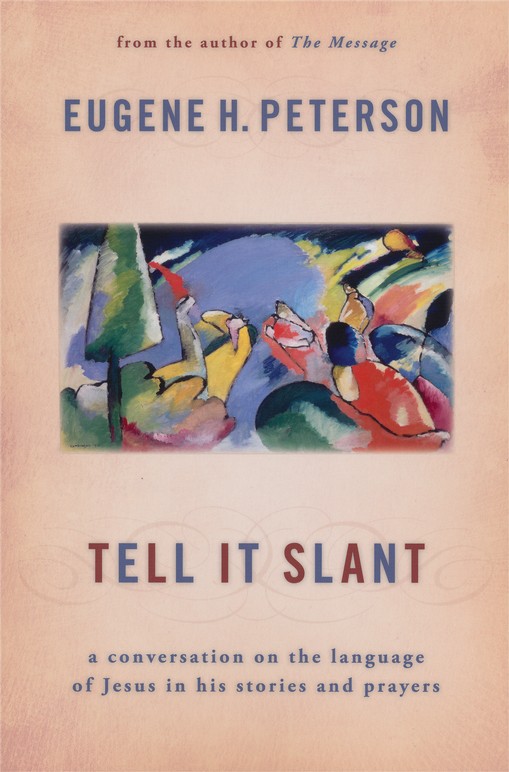
- Eat this Book – this book was so encouraging because it affirmed my approach to reading scripture, to consume like food rather than to read like a statute book or book of disjointed stories. For me, the chief revelation is the revelation of Jesus Christ. He is holds the entire narrative of the Bible together from Genesis to Revelation. Here is a summary from Amazon,”Eat This Book challenges us to read the Scriptures on their own terms, as God’s revelation, and to live them as we read them. With warmth and wisdom Peterson offers greatly needed, down-to-earth counsel on spiritual reading. In these pages he draws readers into a fascinating conversation on the nature of language, the ancient practice of lectio divina, and the role of Scripture translations; included here is the “inside story” behind Peterson’s own popular Bible translation, The Message.”

- This Hallelujah Banquet: How the End of What We Were Reveals Who We Can Be – given the pandemic and political turmoil of our day, I have been thinking a lot about the book of Revelation and what it means for today. There is so much speculation and commentary on the book of Revelation that it is hard to discern fact from fantasy. My goal has been to see and hear from Jesus directly in this part of the Bible and what it means for today. Peterson’s work more than any other has influenced my understanding. Peterson’s book connected me to the pastoral heart of the Apostle John as he ministers to the churches under His care while in exile on the Island of Patmos. Understanding Revelation from the perspective of a Pastor ministering to people in churches who are struggling in their faith and facing adversities has opened up this mysterious book of the Bible to me in new and refreshing ways. The prophesy and imagery make a lot more sense to me as a Pastor trying to minister to people who are struggling in their faith during times of uncertainty and great turmoil. I plan on sharing messages from Revelation this year that I hope will bring people into the safety and security only found in Christ.
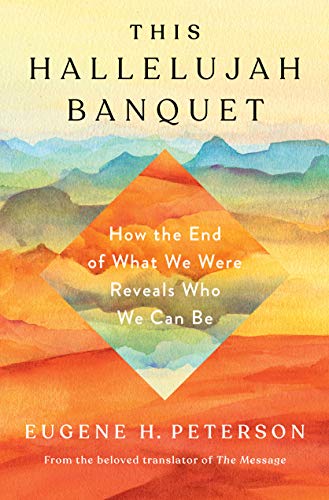
- Christ Plays in Ten Thousand Places: A Conversation in Spiritual Theology – having the Pastor of Pastors walk through the Bible with you was a real treat. I will need to re/read this book next year to truly benefit from what was imparted. This is a good summary of the book,”Christ Plays in Ten Thousand Places reunites spirituality and theology in a cultural context where these two vital facets of Christian faith have been rent asunder. Lamenting the vacuous, often pagan nature of contemporary American spirituality, Eugene Peterson here firmly grounds spirituality once more in Trinitarian theology and offers a clear, practical statement of what it means to actually live out the Christian life.”

- Practice Resurrection: A Conversation on Growing Up in Christ – for anyone interested in knowing what it means to live by the life of Jesus Christ, this book is essential. Profound and practical, this book has been helped me understand and live in the resurrected life of Jesus. This also is a great commentary on the book of Ephesians, which is probably my favorite Pauline letter.

- The Pastor: A Memoir – if I could recommend one book to a person on what it means to be a Pastor, I would recommend this book. In my view, Eugene Peterson is the embodiment of what a Pastor is and should be. He reminds me a lot of Pastor Mark Evans in his tone, temperament, and focus on the patient work of relationship building with the people he has been given to love and serve. “In The Pastor, author Eugene Peterson, translator of the multimillion-selling The Message, tells the story of how he started Christ Our King Presbyterian Church in Bel Air, Maryland and his gradual discovery of what it really means to be a pastor. Steering away from abstractions, Peterson challenges conventional wisdom regarding church marketing, mega pastors, and the church’s too-cozy relationship to American glitz and consumerism to present a simple, faith-based description of what being a minister means today. In the end, Peterson discovers that being a pastor boils down to “paying attention and calling attention to ‘what is going on now’ between men and women, with each other and with God.”

- A Burning in My Bones: The Authorized Biography of Eugene H. Peterson, Translator of The Message (by Winn Collier)- this book was not written by Peterson, but by an authorized biographer who really does a great job of capturing who Eugene Peterson was and why his ministry and example are so important to those of us who care deeply about healthy pastoral ministry. This book should be read side by side with Peterson’s book the Pastor a Memoir if you are really serious about getting to know him. I never met Eugene Peterson, but I feel like I spent a summer at his home in Montana with him after reading almost all of his books and this point any biography by Mr. Collier.
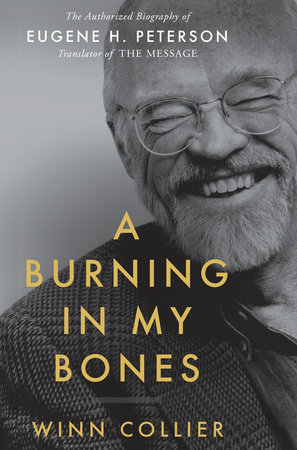
Eric Peterson
- Letters to Young Pastor – this book is so very precious. I am grateful to Eugene Peterson’s son, Eric, for publishing these letters for us all the benefit from. Almost every letter ends with some expression of love from a dad to his son that really resonated with me. Warning: If you listen to this book on Audible, the last two minutes will completely wreck you. Be prepared for a good cry.
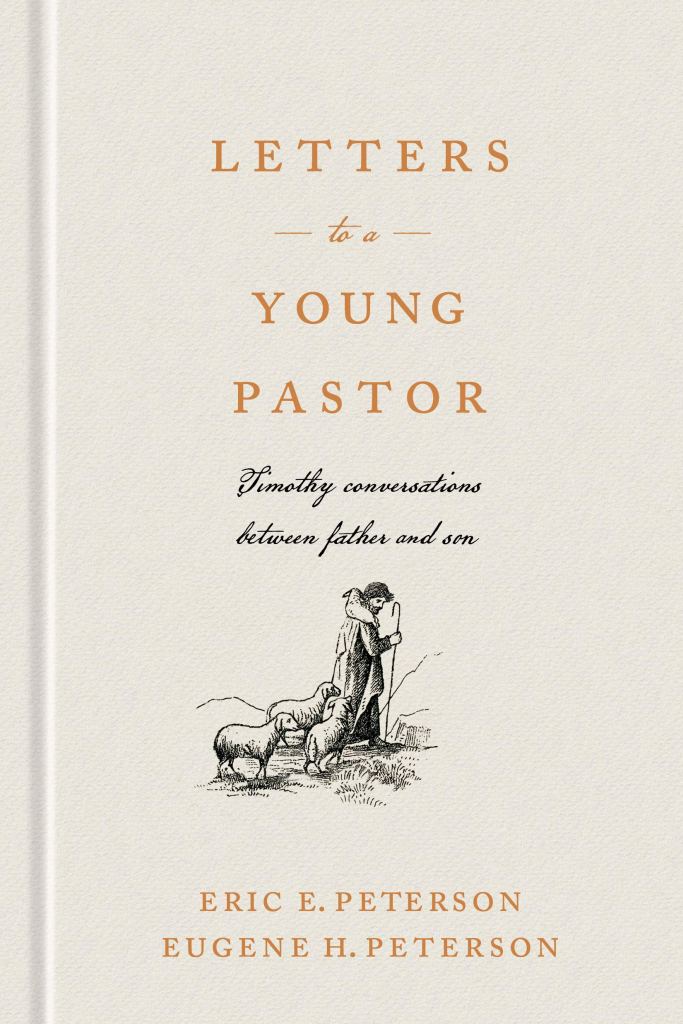
- Letters to a Young Congregation: while Pastor Eric has his own voice, you can hear echoes of his dad reverberate through each of his letters to his congregation. Pastor Eric is a great example of a pastor loves each person on his congregations and that comes through in each letter.

- Wade in the Water – The most complete and inspiring exposition on baptism I have read by an evangelical. Eric Peterson is a Pastor who has anchored His ministry in His baptismal identity. We are the beneficiaries of all God has done to sign, seal, and deliver Pastor Eric as he throughly expounds on the vital role baptism plays in our Christian identity. He mixes scholarly analysis with vivid story telling to capture the imagination of the reader concerning the life giving waters of baptism. This work will be a fundamental resource to how I think about baptism in my life and in my ministry as a lawyer and pastor going forward. Although I have never met or spoken with Pastor Eric, I feel a kinship with him through His work and as a member of the family of saints who have been gathered together as one in and through the baptismal waters of the Kingdom of God established on earth. I highly recommend this book.

John Eldridge
- Fathered by God: Learning What Your Dad Could Never Teach You– this book was a hard book for me to read and listen to, but caused some things to stir in me as I continue to heal from the wounds I sustained as a young person. Some wounds take a lifetime to heal, but the process of healing brings unexpected joys in life if you don’t let the pain consume you. It was one of those books that I originally jumped into, caused me to meditate on deep things in me I don’t necessarily understand, and then set aside due to life and other things crowding me out, and then picked up again. Anyway, chapter 3 on boyhood really wrecked me. It touched on the theme of being valued (using slightly different language “beloved son”). Our Father is used this book to express to me how much he really loves me. This message is sometimes hard to receive and believe even after 30 + years walking with Him in Christ by His Spirit. Sometimes I think I have to do more to earn His love, when all He wants is for me to receive His love and enjoy Him as God and Father.
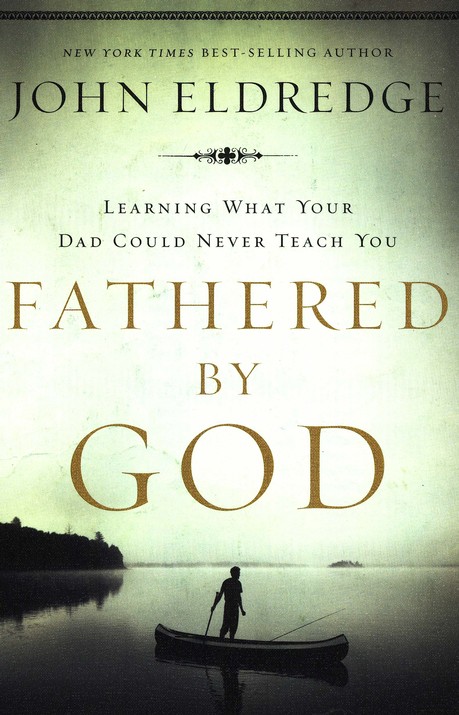
- Walking With God: Talk to Him, Hear From Him, Really (in progress) – this book uses stories and practical examples to show and teach what an intimate relationship with God looks like day to day. Very practical guidance on how to walk and talk with God.

Brian Zhand
- Postcards from Babylon: The Church In American Exile – this book serves as a prophetic rebuke of Christian nationalism. Eye opening. Provocative. Challenging to many sacred cows in “cultural Christianity.” I appreciate the courage and love Pastor Brian Zhand demonstrates in writing this book. Here is a good summary of what to expect when you read: “The original gospel proclamation that the Lord of the nations was a crucified Galilean raised from the dead and that salvation was found in vowing allegiance to Jesus of Nazareth unleashed a shock wave that turned the Roman Empire upside down. Early Christianity was subversive and dangerous—dangerous for Christians and a threat to the keepers of the old order. Most of all Christianity was countercultural. But what about contemporary American Christianity? Is it the countercultural way of Jesus or merely a religious endorsement of Americanism? In this provocative book, Brian Zahnd challenges the reader to see and embrace a daring Jesus-centered Christianity that can again turn the world upside down.”


- The Unvarnished Jesus: A Lenten Journey – this book gave me a new appreciation for lent. “The Unvarnished Jesus is a forty-six day Lenten journey taking the reader from Ash Wednesday to Holy Saturday on a quest to encounter Jesus in a new and startling way. These forty-six daily meditations on the life and ministry of Jesus drawn from Matthew, Mark, Luke, and John are a spiritual solvent to help remove the layers of lacquer comprised of political and cultural assumptions that prevent us from seeing just how challenging and compelling Jesus of Nazareth really is. The Unvarnished Jesus is a forty-six day project to restore the incomparable image of Christ.”
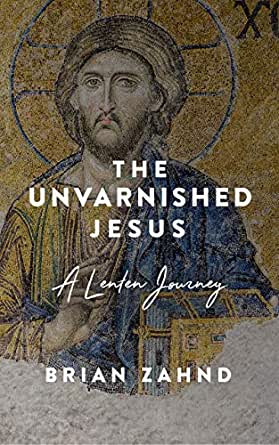
Ken Boa
- A Journal of Sacred Readings (in progress) – For readers seeking to deepen their quiet times, these lessons in lectio divina provide a complete, direct path to the face of God. Lectio divina-the art of sacred reading-has brought many throughout the ages to an intimate relationship with God. These journals now make the process accessible to today’s readers in a practical, hands-on way. Each journal comes complete with in-depth instructions and plenty of journaling room. The daily sessions include Scripture and questions to guide readers through each step of lectio divina. Through these journals, readers will deepen their times with God as they study the sacred Scriptures and historic creeds of the faith.

- Handbook to Leadership: Leadership in the Image of God (in progress) – Handbook to Leadership has four parts: 1) 52-Week Leadership Guide, 2) Topical Leadership Guide, 3) Leadership Character Studies, and 4) Books of the Bible Leadership Guide. This provides a great in-depth study of leadership from a biblical point of view.

Various authors
- Uncommon Ground: Living Faithfully in a World of Difference– Bestselling author Timothy Keller and legal scholar John Inazu bring together a thrilling range of artists, thinkers, and leaders to provide a guide to faithful living in a pluralistic, fractured world. How can Christians today interact with those around them in a way that shows respect to those whose beliefs are radically different but that also remains faithful to the gospel? Timothy Keller and John Inazu bring together illuminating stories–their own and from others–to answer this vital question. Uncommon Ground gathers an array of perspectives from people thinking deeply and working daily to live with humility, patience, and tolerance in our time. Contributors include: Lecrae,Tish Harrison Warren, Kristen Deede Johnson, Claude Richard Alexander, Shirley Hoogstra, Sara Groves, Rudy Carrasco, Trillia Newbell, Tom Lin, Warren Kinghorn each Providing varied and enlightening approaches to reaching faithfully across deep and often painful differences, Uncommon Ground shows us how to live with confidence, joy, and hope in a complex and fragmented age.

- The Loneliness Epidemic: Why So Many of Us Feel Alone–and How Leaders Can Respond by Susan Mettes (in progress)- What makes people lonely? And how can Christian communities better minister to the lonely? In The Loneliness Epidemic, behavioral scientist and researcher Susan Mettes explores those questions and more. Guided by current research from Barna Group, Mettes illustrates the profound physical, emotional, and social toll of loneliness in the United States. Surprisingly, her research shows that it is not the oldest Americans but the youngest adults who are loneliest and that social media can actually play a positive role in alleviating loneliness. Mettes highlights the role that belonging, friendship, closeness, and expectations play in preventing it. She also offers meaningful ways the church can minister to lonely people, going far beyond simplistic solutions–like helping them meet new people–to addressing their inner lives and the God who understands them. With practical and highly applicable tips, this book is an invaluable tool for anyone–ministry leaders, parents, friends–trying to help someone who feels alone. Readers will emerge better able to deal with their own loneliness and to help alleviate the loneliness of others. Foreword by Barna Group president David Kinnaman.
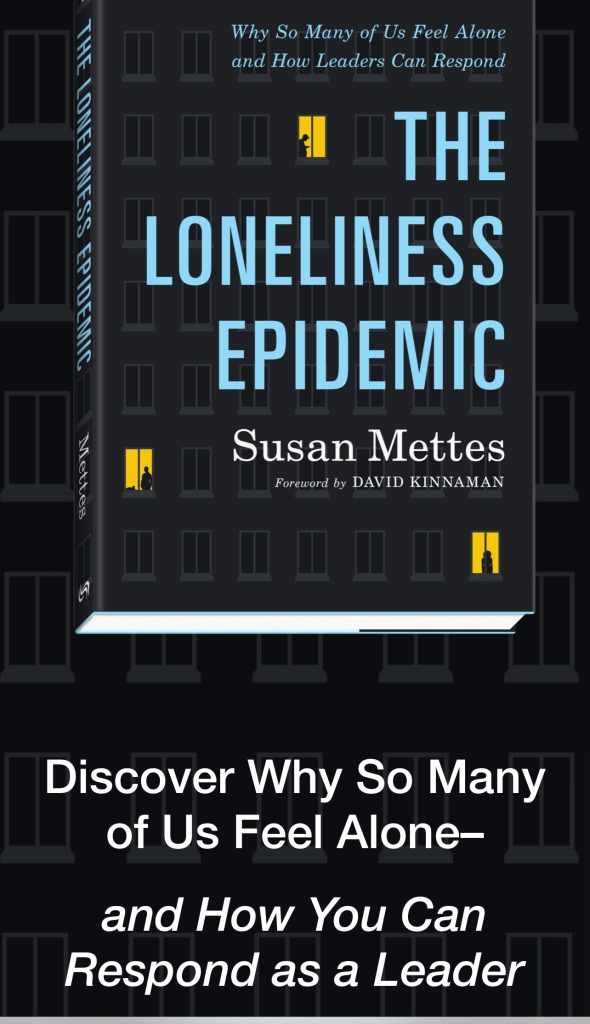
- Catherine Wheels (in progress) by Leif Peterson – I am currently reading this book. Here is a description: “Thomas’s carefully built life has been shattered. Everywhere he turns, he finds tragedy. After being left at the altar, he retreats to a remote castle in the mountains of Northwest Montana to live with an old college friend dying of lupus. But their painfully peaceful seclusion is ripped apart by the news that Thomas’s brother, an Episcopal priest, has killed himself–and his sister-in-law is abandoning her seven-year-old daughter, Catherine, into Thomas’s care. After her unexpected arrival into this grim corner of the world, Catherine slowly breaches the isolation and penetrates the self-absorption. Like the prayer wheel on the wall of a nearby convent, Catherine gently but surely pulls the various dying people around her into the robust company of the loving and living. Catherine Wheels is a lyrical novel of hope and redemption, the honest story of men and women who have had all the zest for life knocked out of them–damaged souls who are slowly brought back to health by a little girl who knows something the rest of them either never knew or had forgotten: something about prayer, love, and sacrifice.”

- Gentle and Lowly by David Ortlund – I love books that reveal the heart of Jesus for you and I. This is a great book. Christians can easily feel that Jesus is perpetually disappointed and frustrated, maybe even close to giving up on them. They know what Christ has done for them―but who is he? How does he feel about his people amid all their sins and failures? In Matthew 11, Jesus describes himself as “gentle and lowly in heart,” longing for his people to find rest in him. This book reflects on his words, diving deep into Bible passages that speak of Christ’s affections for sinners and encouraging believers as they journey, weary and faltering, toward heaven.

- The Jesus Person Promise Book (in progress) – I am going through all 800 promises and highlighting them in a Bible to give as a gift to Adeline when she graduates later this year. 800 promises from the Word of God with biblical answers to almost every spiritual and personal problem encountered today. The promises are categorized to speak to specific situations for quick reference. Find hope and the knowledge of God’s abundant grace through reading God’s promises, one after another. Your faith will be strengthened and your soul encouraged.

- Offer Yourselves to God: Vocation, Work, and Ministry in Paul’s Epistles (in progress) – this book was a gift Kim and I from Jeff Greenman, President of Regent College in Vancouver, British Columbia when we visited back in October. Renowned New Testament scholar Gordon Fee explores the meaning of Christian witness and service in every area of life. Focusing on the implications of every Christian’s calling to belong to Christ, Fee reframes our contemporary quest for a more seamless, integrated faith. His careful examination of the context and message of Paul’s letters sheds light on how a Christian identity is lived out in home, workplace, and church.

- The Descent of the Dove (in progress) by Charles White – The Descent of the Dove” is an unconventional study of the Church as governed by the activity of the Holy Spirit in history. It the most significant of Williams’ theological writings.


- Introduction to the History of Christianity (in progress) – Tim Dowley’s masterful one-volume survey of church history has an updated design and new content, particularly in the section covering most recent Christian history. The inviting full-color format includes many new images and updated maps, while maintaining many of the features that made the second edition a popular volume for the classroom. Dowley has assembled a global cast of respected scholars to write the full story of the rise of the Christian faith and to provide a rounded picture of the worldwide development of Christianity. The volume has been praised as accurate, scholarly, and balanced. Its writers are committed to Christianity but also to the unhindered pursuit of truth that does not avoid the darker aspects of the varied story of Christianity. The accessible text is supported by detailed timelines, maps, profiles of key figures in Christianity, colorful images, and a complete glossary. Each section includes questions for discussion.

- Lead Like Christ: Reflecting The Qualities and Character of Christ in Your Ministry– AW Tozer – As a Christian, does your leadership approach look any different from that of those who don’t follow Christ? Throughout the Bible, God shows us what leadership looks in His kingdom, and sometimes it can seem upside-down. The first shall be last. The master shall be the servant. But how can we apply these counterintuitive truths in our world today? Rather than focusing on the nuts and bolts of management, Lead like Christ uses the book of Titus to take a close look at what biblical leadership entails. Using Paul’s instructions to his young ministry partner as a guide, Tozer takes us through themes of grace, servanthood, spiritual boldness, and humility toward the Word of God. This foundation will lead to powerful, long-lasting change in both your own leadership role today as well as in God’s eternal kingdom.
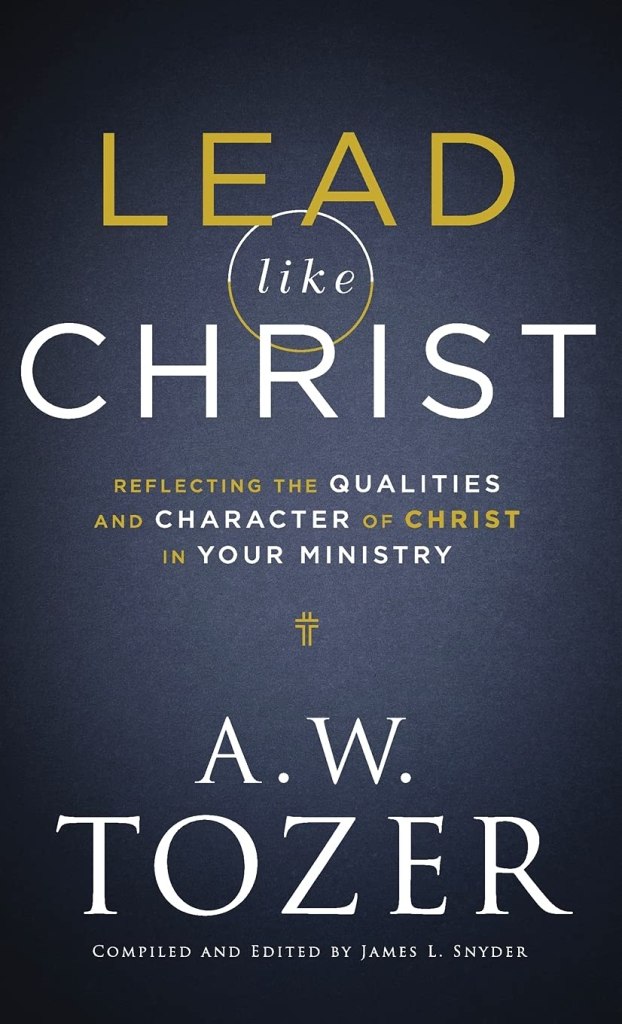
Devotionals, Blogs, Podcasts, web community
In addition to the foregoing books, I also read or listen to content on the following blogs, podcasts and online communities:
- Deeper Christian Life Network
- Christ is All Podcast
- Beyond Evangelical
- Ken Boa – Reflections
- A Day in Your Presence
Magazines
- Christian History Magazine: Christian History is a magazine on the history of Christianity. It was established by Ken Curtis in 1982 and published by the Christian History Institute. It began as a series of resource guides designed to supplement films about major figures in the history of the church, transitioning from an “occasional” publication to a quarterly magazine in 1984.[1] In 1989, it was sold to Christianity Today International, which changed the name of the magazine to Christian History & Biography in 2004. In 2008 publication ceased after issue 99. Christian History Institute reclaimed custody of the title and revived the publication in 2011.
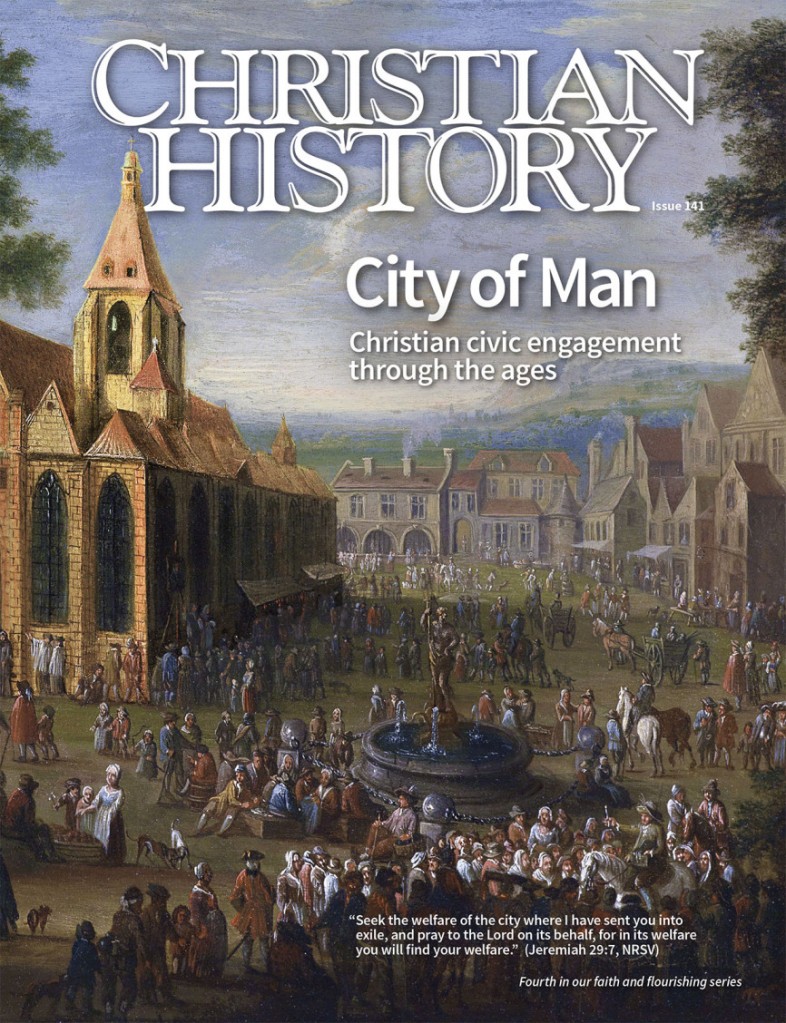
- CRUX, a journal of Christian thought and opinion, seeks to expound the basic tenets of the Christian faith and to demonstrate that Christian truth is relevant to the whole of life. Its particular concern is to relate the teachings of Scripture to a broad spectrum of academic, social and professional areas of interest, to integrate them and to apply the insights gained to corporate and personal Christian life and witness.
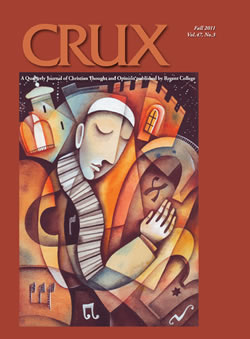
- Christian Science Monitor Weekly Magazine – National and International news- “The Christian Science Monitor is an international news organization that helps you see news events as starting points for constructive conversations. We seek to cut through the froth of the political spin cycle to underlying truths and values. We want to be so focused on progress that together we can provide a credible and constructive counter-narrative to the hopelessness-, anger-, and fear-inducing brand of discourse that is so pervasive in the news. We’re committed to the following three things: We will challenge conventional thinking. As forces from politics to social media try to break us into competing tribes—political, racial, or economic – together we’ll rethink the question “Who is my neighbor?” We will listen to you. We need you to hold us accountable – to keep us honest and grounded. To inspire us with what inspires you. Together, we can build a community of people who ask more from news. We will change how you see news. News must be accurate and trustworthy, but facts alone can miss the whole story—the story of us. We are much better than much of today’s news portrays us to be. We will have the courage to look into both the best and the worst in us – and not to blame, but to demand better.”

- The Nevada Independent – local news – The Nevada Independent is a nonpartisan, nonprofit news and opinion website founded in 2017 by veteran political journalist and commentator Jon Ralston. The site and its supporting channels are focused on ethical, unbiased and transparent journalism. In general, we aim to gather and disseminate important public information and


















